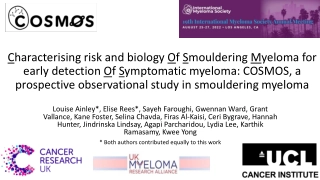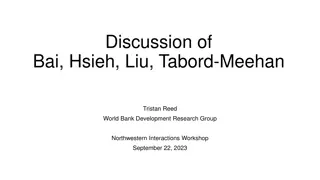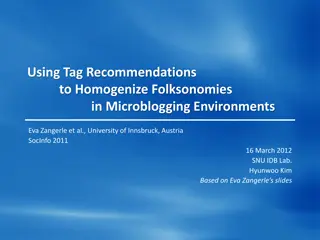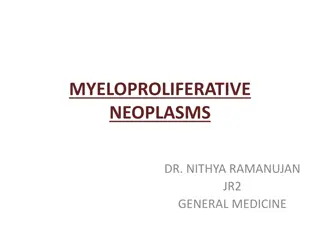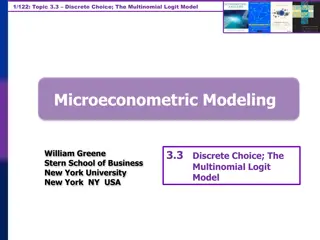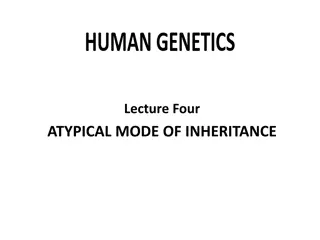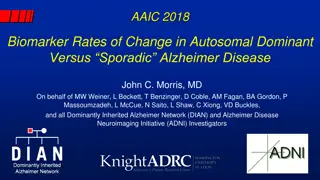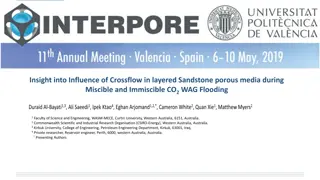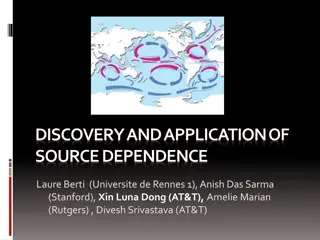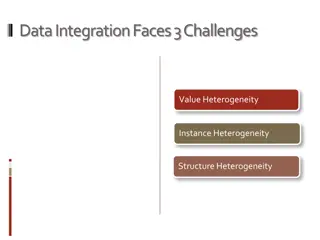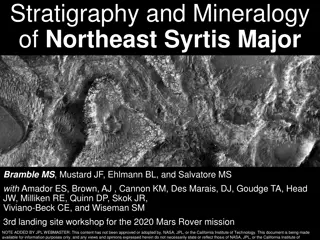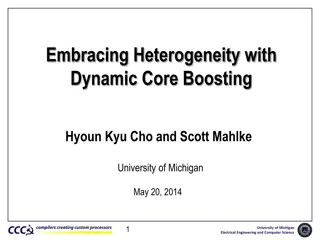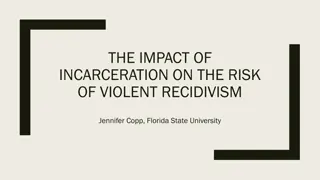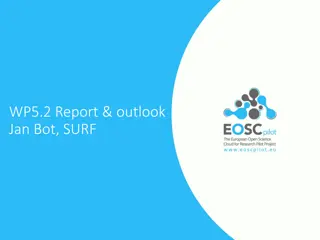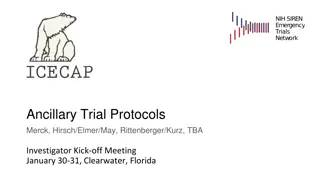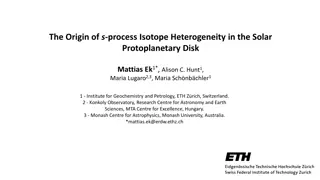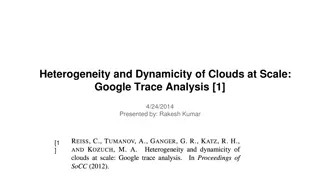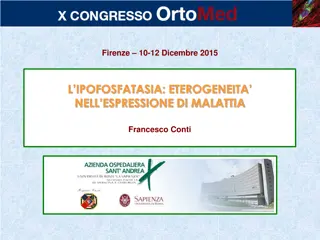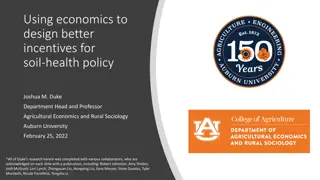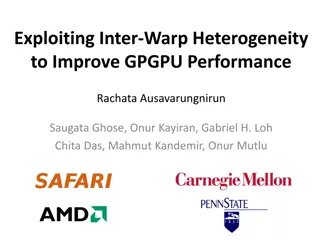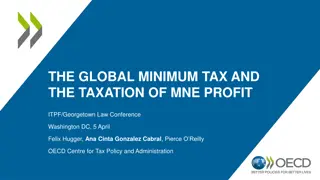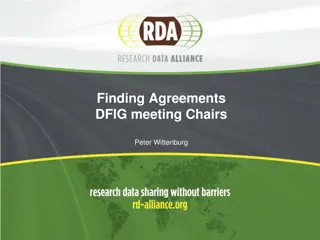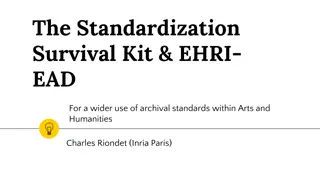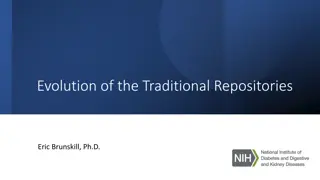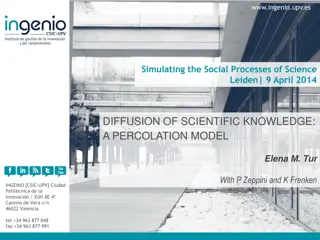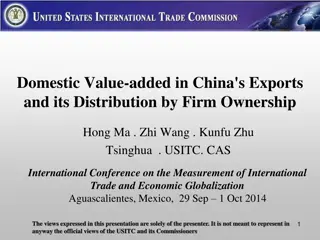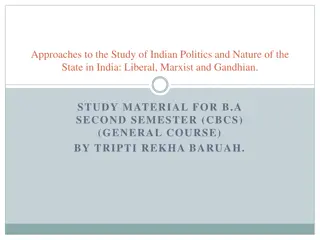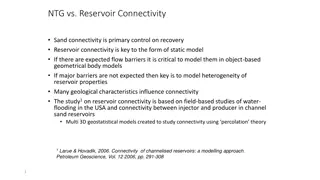Characterising Risk and Biology of Smouldering Myeloma for Early Detection of Symptomatic Myeloma
Understand the risk and biology of smouldering myeloma (SMM) for early detection of symptomatic myeloma. The study will investigate genomic and immune correlates of progression, clonal heterogeneity, and biomarkers using liquid biopsies and T cell phenotype and functionality in SMM.
4 views • 15 slides
Practically Adopting Human Activity Recognition
Cutting-edge research in Human Activity Recognition (HAR) focuses on practical adoption at scale, leveraging labeled and unlabeled data for inference and adaptation. Prior works explore models like LIMU-BERT and address challenges in combating data heterogeneity for feature extraction.
0 views • 35 slides
Understanding the Paradox of Plankton and Biodiversity Correlates
The paradox of plankton challenges the theory that the number of species should match available resources, as seen in diverse plankton ecosystems. Explanations include resource partitioning, temporal and spatial heterogeneity, predation, adaptation to disturbance, and evolutionary processes. Biodive
3 views • 40 slides
Insights into Investments and Convergence in Central Eastern Europe
Explore the dynamics of investments, convergence, and capital inflows in Central Eastern Europe, delving into the role of investment capital in the convergence process, the impact of foreign capital, and the heterogeneity across various countries in the region. Discover how savings, investments, GDP
0 views • 11 slides
Understanding Multiple Sequence Alignment with Hidden Markov Models
Multiple Sequence Alignment (MSA) is essential for various biological analyses like phylogeny estimation and selection quantification. Profile Hidden Markov Models (HMMs) play a crucial role in achieving accurate alignments. This process involves aligning unaligned sequences to create alignments wit
0 views • 29 slides
Discussion of Randomized Experiments and Experimental Design Challenges
Randomized experiments face statistical power challenges due to rare outcomes and high variance. Stratifying randomization can help control for correlated residual variance based on baseline values of outcomes. Implications for applied economists include addressing attrition and treatment effect het
0 views • 6 slides
Enhancing Folksonomies in Microblogging with Tag Recommendations
The study explores the use of hashtag recommendations to homogenize folksonomies in microblogging environments, aiming to improve search capabilities, categorization, and reduce heterogeneity by avoiding synonymous hashtags. By proposing a solution for recommending suitable hashtags, the research se
0 views • 21 slides
Understanding Myeloproliferative Neoplasms: Overview and Clinical Considerations
Myeloproliferative neoplasms (MPNs) include a group of disorders characterized by overproduction of blood cells. The WHO classification outlines eight disorders with varied clinical presentations and potential for transformation. These disorders, such as CML, CNL, and PV, exhibit significant phenoty
2 views • 58 slides
Microeconometric Modeling with Multinomial Logit Model
The topic discusses the Multinomial Logit Model in the context of discrete choice modeling, covering concepts, models, consumer preferences, utility maximization, and implications for discrete choice models. It explores how consumers maximize utility under budget constraints, the need for well-defin
0 views • 58 slides
Understanding Atypical Patterns of Inheritance in Genetics
Explore atypical modes of inheritance such as codominant traits, pseudodominant inheritance, mitochondrial inheritance, anticipation, pleiotropy, variable expressivity, heterogeneity, new mutation, and complex traits in genetics. Learn about codominance, pseudodominance, and atypical presentation of
0 views • 26 slides
Biomarker Rates of Change in Autosomal Dominant vs. Sporadic Alzheimer Disease
Autosomal Dominant Alzheimer Disease (ADAD) and Sporadic Late Onset Alzheimer Disease (LOAD) show distinct clinical presentations, neuropathological features, and rates of progression. The DIAN-ADNI Comparison Study aims to investigate if ADAD and LOAD share the same pathophysiology and how they res
0 views • 16 slides
Challenges of Managing Digital Data in Our Lives
The digital age has brought about an explosion of data, from personal information to metadata produced by various sources. Our lives are now intertwined with data, leading to issues of dispersion, heterogeneity, and privacy concerns. Managing this vast amount of data across different systems and pla
0 views • 29 slides
Optimizing Glycoprofiling Analytical Method for Therapeutic Proteins
Glycoproteins play a significant role in biopharmaceuticals, necessitating detailed characterization due to their structural heterogeneity from glycosylation. This study focuses on developing a robust and cost-effective characterization method using a Definitive Screening Design to optimize an HPAE-
0 views • 13 slides
Influence of Crossflow in Layered Sandstone Porous Media During CO2 WAG Flooding
Reservoir heterogeneity significantly impacts oil recovery processes and flood conformance. Research findings show that Miscible WAG outperforms Immiscible WAG, with crossflow affecting sweep efficiency. Increased permeability ratio leads to channelling of CO2, affecting oil saturations and recovery
1 views • 4 slides
Challenges and Solutions in Data Integration
Facing challenges like data conflicts, instance and structure heterogeneity, the field of data integration encounters complexities in schema matching, model management, and query answering. Existing solutions assuming independence of data sources are now impacted by advanced technologies enabling ea
0 views • 22 slides
Challenges in Data Integration: Heterogeneity and Solutions
Data integration faces challenges such as value heterogeneity, instance heterogeneity, and structure heterogeneity. Existing solutions assume independence of data sources and utilize methods like data fusion, truth discovery, string matching, object matching, schema matching, and model management. T
0 views • 5 slides
Analysis of Measuring Services and Value Added Shares in National Accounts
Measuring services in national accounts involves challenges due to the intangibility and heterogeneity of services. The estimation of output and prices is complex, especially in the fastest-growing sector of services. This analysis includes coverage of various industries and their NIC codes, as well
0 views • 26 slides
Stratigraphy and Mineralogy of Northeast Syrtis Major
High-resolution work on Northeast Syrtis Major reveals diverse igneous lithologies and alteration products in a clear stratigraphy. The region displays great morphological heterogeneity at a decameter scale, yet it can be unified under five distinct geomorphic units. Geomorphic mapping and stratigra
0 views • 31 slides
Dynamic Core Boosting for Heterogeneous Computing
Exploring the challenges of workload heterogeneity in parallel programming, focusing on the impact of asymmetric hardware on performance and synchronization. Insights on modeling workload imbalance and boosting critical paths for efficient computation in heterogeneous multicores.
0 views • 22 slides
Exploring Funnel Plots in Meta-analysis with Metafor in R
Funnel plots in meta-analysis help assess distribution symmetry, heterogeneity, and publication bias. The trim and fill analysis with Metafor in R examines data transformations, imputes missing values, and performs sensitivity analysis through re-computing funnel plots.
0 views • 4 slides
The Impact of Incarceration on Violent Recidivism: A Comprehensive Analysis
Delve into the complex relationship between incarceration and violent recidivism, exploring theories, prior research findings, and the potential for heterogeneity in the effects of imprisonment on reoffending. Recognize the significance of understanding the impact of incarceration on reducing violen
0 views • 10 slides
Challenges and Design of EOSC Service Portfolio Management
Challenges faced in managing the European Open Science Cloud (EOSC) service portfolio include federated settings, provider heterogeneity, consumer heterogeneity, and balancing service quality with inclusiveness. The design aims to augment existing ITSM frameworks with EOSC-specific processes while a
0 views • 16 slides
Precision Medicine Approach for Post-cardiac Arrest Care Study
Study aims to develop novel biomarkers for optimizing hypothermia duration post-cardiac arrest and predicting 90-day function. Overcoming past limitations in neuroprognostication research, the study utilizes a multicenter approach and standardizes post-resuscitation care protocols. Addressing challe
0 views • 13 slides
Understanding PEBELS in Liberty Mutual Group Insurance
PEBELS, an innovative approach in Liberty Mutual Group insurance, focuses on Property Large Loss Exposure Segmentation to address challenges like strong regional focus, state/program variations, and high heterogeneity. It involves defining and deriving methodologies for handling various insurance se
0 views • 33 slides
Understanding Isotope Heterogeneity in Solar Protoplanetary Disk
Explore the origin of s-process isotope heterogeneity in the solar protoplanetary disk, delving into cosmochemistry, isotopic variations in meteorites, and the significance of internal normalization. Discover the correlation between Pd isotope compositions in iron meteorites and the solar system s-p
0 views • 17 slides
Understanding Cloud Heterogeneity and Dynamicity: A Google Trace Analysis
Exploring the heterogeneity and dynamic nature of clouds at scale using Google Trace Analysis, focusing on machine allocation, workload types, job durations, task shapes, and machine churn. The study offers insights into resource allocation in evolving multi-tenant clusters and highlights the challe
0 views • 16 slides
Understanding Heterogeneity in Hypophosphatasia: A Case Study in Phenotypic Variability
This case study explores the diverse expression of hypophosphatasia in a Caucasian female patient, highlighting the challenges in diagnosis and treatment. The patient presented with chronic pain, fractures, myopathy, and dental issues, underscoring the complexity of genotype-phenotype correlations i
0 views • 23 slides
Economics for Improving Soil Health Policy Incentives
Utilizing economic principles to enhance incentives in soil health policies can lead to more effective programs. Government initiatives already incorporate economic designs, but there is room for improvement. Factors such as recruitment strategies, benefit heterogeneity, and budget allocation can be
0 views • 16 slides
Enhancing GPGPU Performance through Inter-Warp Heterogeneity Exploitation
This research focuses on addressing memory divergence issues in GPGPUs by exploiting inter-warp heterogeneity. By prioritizing mostly-hit warps and deprioritizing mostly-miss warps through Memory Divergence Correction (MeDiC), significant performance and energy efficiency improvements were achieved
0 views • 45 slides
The Global Minimum Tax and MNE Profit Taxation
The OECD has conducted an extensive economic impact assessment of the Global Minimum Tax (GMT) for multinational enterprises (MNEs), focusing on tax rate differentials, profit shifting, low-taxed profits, and revenue gains. The research includes building a matrix of profit locations, assessing ETR h
0 views • 16 slides
Advancing Data Interoperability through DFIG Meeting Insights
Explore the key discussions and suggestions from a recent DFIG meeting chaired by Peter Wittenburg. Topics include addressing data heterogeneity, leveraging RDA for change, engaging with active groups, and proposing strategies for progress like defining data bundles and focusing on persistent identi
0 views • 10 slides
Scaling Big Data Mining Infrastructure: The Twitter Experience
The paper explores the challenges faced by Twitter in scaling its analytics infrastructure to handle massive amounts of data. It discusses the importance of schemas, data cleaning, and formulating precise analytical questions. Methods used for logging and structuring log messages are also highlighte
1 views • 20 slides
Innovative Approach to Managing Archival Standards in Arts and Humanities
Explore the Standardization Survival Kit (SSK) and EHRI-EAD for a wider adoption of archival standards in Arts and Humanities. The SSK provides a documented and reusable system to manage the heterogeneity of EAD, offering an open platform for hosting resources related to metadata standards in resear
0 views • 24 slides
Understanding and Modeling the Low-Level Jet (LLJ) Phenomenon
Explore the structure and evolution of the Low-Level Jet (LLJ) phenomenon through combined observations and numerical models. The focus is on the LLJ across the PECAN domain, spatial and temporal variability, heterogeneity with height, continuity across cases, and evening transition effects. Efforts
0 views • 4 slides
Challenges and Opportunities in Data Management for Biomedical Research
Managing data in biomedical research repositories poses challenges such as data heterogeneity, quality issues, privacy concerns, standardization, and technical infrastructure requirements. Addressing these challenges through technology like data integration platforms, machine learning, cloud computi
0 views • 4 slides
Understanding the Resource-Based View Model for Competitive Advantage
Exploring the Resource-Based View (RBV) model by Margaret Peteraf, this content delves into the origins of heterogeneity, valuable resources, and sustainable competitive advantage. It highlights four necessary conditions for gaining a competitive edge and discusses the concept of Ricardian Rent in e
0 views • 14 slides
Social Processes of Science: A Percolation Model
Exploring the diffusion of scientific knowledge through social networks, this study investigates the impact of social pressure and assortativity on the spread of ideas. With a focus on social dynamics and network structures, it delves into how local interactions influence global diffusion patterns.
0 views • 24 slides
Analysis of Domestic Value-Added in China's Exports by Firm Ownership
This study delves into the distribution of domestic value-added in China's exports based on firm ownership types. By decomposing gross exports into domestic and foreign value-added, it aims to understand how value is distributed among different factor owners to quantify the generated gross national
0 views • 22 slides
Approaches to Study of Indian Politics: Liberal, Marxist, and Gandhian Perspectives
Political Science encompasses various approaches such as Liberal, Marxist, and Gandhian for studying Indian politics. Scholars have explored the nature of the Indian state post-independence, focusing on democratization, social heterogeneity, and class dynamics. The Marxist approach views the state a
0 views • 14 slides
Understanding Reservoir Connectivity and Its Impact on Recovery Models
Sand connectivity plays a crucial role in reservoir recovery, with reservoir properties' heterogeneity influencing connectivity. Field-based studies in the USA focus on water-flooding and injector-producer connectivity in channel sand reservoirs. Geostatistical models using percolation theory help s
0 views • 4 slides
